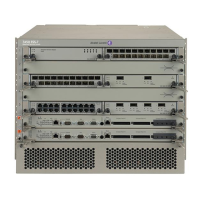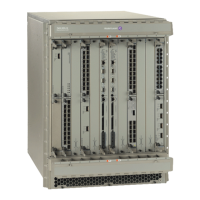Class Fair Hierarchical Policing (CFHP) Policy Command Reference
882 Quality of Service Guide
The highest in-use priority level’s discard-all threshold is the total burst tolerance of the parent policer.
In some cases the parent policer represents downstream bandwidth capacity and the max-rate of the
parent policer is set to prevent overrunning the downstream bandwidth. The burst tolerance of the
parent policer defines how much more traffic may be sent beyond the downstream scheduling capacity.
In the worst case scenario, when the downstream buffering is insufficient to handle the total possible
burst from the parent policer, downstream discards based on lack of buffering may occur. However, in
all likelihood, this is not the case.
In most cases, lower priority traffic in the policer will be responsible for the greater part of congestion
above the parent policer rate. Since this traffic is discarded with a lower threshold, this lowers the
effective burst tolerance even while the highest priority traffic is present.
Configuring a Priority Level's MBS Contribution Value
In the most conservative case, a priority level’s mbs-contribution value may be set to be greater than
the sum of child policer’s mbs and one max-size-frame per child policer. This ensures that even in the
absolute worst case where all the lower priority levels are simultaneously bursting to the maximum
capacity of each child, enough burst tolerance for the priority’s children will exist if they also burst to
their maximum capacity.
Since simply adding up all the child policer’s PIR MBS values may result in large overall burst
tolerances that are not ever likely to be needed, you should consider some level of burst
oversubscription when configuring the mbs-contribution value for each priority level. The amount of
oversubscription should be determined based on the needs of each priority level.
Using the Fixed Keyword to Create Deterministic Parent Policer Discard Thresholds
In the default behavior, the system ignores the mbs-contribution values for a priority level on a
subscriber for 7450 ESS and 7750 SR, or a multi-service site for 7950 XRS, or SAP parent policer
when a child policer is not currently associated with the level. This prevents additional burst tolerance
from being added to higher priority traffic within the parent policer.
This does cause fluctuations in the defined threshold values when child policers are added or removed
from a parent policer instance. If this behavior is undesirable, the fixed keyword may be used which
causes the mbs-contribution value to always be included in the calculation of parent policer’s discard
thresholds. The defined mbs-contribution value may be overridden on a subscriber sla-profile for the
7450 ESS and 7750 SR, or on a multi-service site for the 7950 XRS, or on a SAP instance, but the fixed
nature of the contribution cannot be overridden.
If the defined mbs-contribution value for the priority level is zero, the priority level will have no
effect on the parent policer’s defined discard thresholds. A packet associated with the priority level will
use the next lower priority level’s discard-unfair and discard-all thresholds.
Default no mbs-contribution
The no mbs-contribution command returns the policy’s priority level’s MBS contribution to the
default value. When changed, the thresholds for the priority level and all higher priority levels for all
instances of the parent policer will be recalculated.
